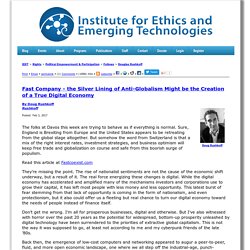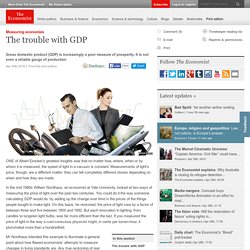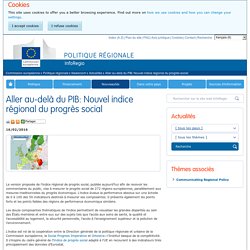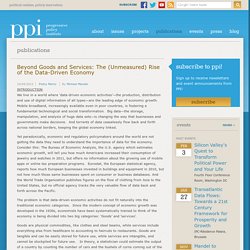

Fast Company - the Silver Lining of Anti-Globalism Might be the Creation of a True Digital Economy. The folks at Davos this week are trying to behave as if everything is normal.

Sure, England is Brexiting from Europe and the United States appears to be retreating from the global stage altogether. Futurist Predictions - Futurist Speaker. “There is no future in any job.

The future lies in the person who holds the job.” – George W. The safe asset scarcity problem, 2050 edition. Measuring the Value of Free by Charles Bean. LONDON – Reliable economic statistics are a vital public good. They are essential to effective policymaking, business planning, and the electorate’s ability to hold decision-makers to account. And yet the methods we use to measure our economies are becoming increasingly out of date. The statistical conventions on which we base our estimates were adopted a half-century ago, at a time when the economy was producing relatively similar physical goods.
Explicit cookie consent. ONE of Albert Einstein’s greatest insights was that no matter how, where, when or by whom it is measured, the speed of light in a vacuum is constant.

Measurements of light’s price, though, are a different matter: they can tell completely different stories depending on when and how they are made. In the mid 1990s William Nordhaus, an economist at Yale University, looked at two ways of measuring the price of light over the past two centuries. You could do it the way someone calculating GDP would do: by adding up the change over time in the prices of the things people bought to make light. On this basis, he reckoned, the price of light rose by a factor of between three and five between 1800 and 1992.
Why It Matters GDP. The Attention Economy: Measuring the Value of Free Digital Servic. "THE CLOTHESLINE PARADOX" I started thinking about this first in the area of open-source software, or for that matter, the Web.

You think about how much value Tim Berners-Lee created and how he didn't actually capture very much of it. It was captured by companies like Google, Apple, Twitter, and Facebook. You also think about the other extreme, where companies like Goldman Sachs managed to extract a great deal of value from the economy, but as the 2008 financial crisis demonstrated, they did so while actually destroying value for the overall economy. What the GDP Gets Wrong (Why Managers Should Care) The irony: We know less about the sources of value in the economy than we did 25 years ago.

Image courtesy of Flickr user Fey Ilyas We see the influence of the information age everywhere, except in the GDP statistics.1 More people than ever are using Wikipedia, Facebook, Craigslist, Pandora, Hulu and Google. Will We Still Target Millennials When They Are 75 or Will We Instead Focus on the Next Generation of Freshly Minted Grown-ups? So asked a recent client of mine when we were (yet again) talking about how to reach millennials.

Time Inc. is trying to win over millennial women. Making it in publishing today requires being able to connect advertisers to young consumers at scale on their preferred digital platform.

That’s a tall order for a magazine company like Time Inc., whose titles have a history of operating autonomously and are rooted in print. So in the past year, Time Inc. has had a string of acquisitions and launches aimed at young women, from Zooey Deschanel’s HelloGiggles (“A Positive Community for Women”) to Motto, a self-help site it spun off of Time magazine. Some of those — beauty startup Mimi, millennial female publisher xoJane and influencer network The Outfit — fall under Deborah Marquardt, general manager of the Time Inc. Style Network. Marquardt, a Maybelline vet, said that as media choices keep expanding (and budgets don’t necessarily keep pace), the challenge is to bring in young digital readers. Aller au-delà du PIB: Nouvel indice régional du progrès social - Politique régionale - Commission européenne. La version proposée de l’indice régional de progrès social, publiée aujourd’hui afin de recevoir les commentaires du public, vise à mesurer le progrès social de 272 régions européennes, parallèlement aux mesures traditionnelles du progrès économique.

L’indice évalue la performance absolue sur une échelle de 0 à 100 des 50 indicateurs destinés à mesurer ses composantes. Il présente également les points forts et les points faibles des régions de performance économique similaire. Les douze composantes thématiques de l’indice permettent de visualiser les grandes disparités au sein des États membres et entre eux sur des sujets tels que l’accès aux soins de santé, la qualité et l’accessibilité au logement, la sécurité personnelle, l’accès à l’enseignement supérieur et la pollution de l’environnement. La mesure du progrès social permet de façonner les stratégies de développement des régions européennes. ST0414 DD%20LC%20GT NIP. Gross Domestic Freebie. Twitter’s recent I.P.O. bonanza gave us all some striking numbers to consider.

There’s the company’s valuation: an astounding twenty-four billion dollars. And its revenue: just five hundred and thirty-five million. It has more than two hundred and thirty million active users, and a hundred million of them use the service daily. They collectively send roughly half a billion tweets every day. Mandel. Votre Indicateur Du Vivre Mieux. Social Progress Index - Data - Social Progress Index. Beyond Goods and Services: The (Unmeasured) Rise of the Data-Driven Economy - Progressive Policy Institute. INTRODUCTION We live in a world where ‘data-driven economic activities’—the production, distribution and use of digital information of all types—are the leading edge of economic growth.

Mobile broadband, increasingly available even in poor countries, is fostering a fundamental technological and social transformation. Big data—the storage, manipulation, and analysis of huge data sets—is changing the way that businesses and governments make decisions. And torrents of data ceaselessly flow back and forth across national borders, keeping the global economy linked. Beyond GDP: Measuring Value in a Service-Oriented, Information-Based, Digital Economy - The CIO Report. Mandel. La valeur et la richesse après la révolution numérique — Welcome to TheFamily.
Le PIB nous permet de mesurer la valeur ajoutée sur notre territoire. Mais sommes-nous certains que cet ajout de valeur nous enrichit ? Je viens de lire dans le New Yorker un article sur l’histoire du produit intérieur brut (PIB). Cet indicateur si imparfait oublie l’environnement et les transactions non marchandes mais continue, après presque un siècle, d’inspirer toutes les décisions de politique économique.
Malheureusement, l’ouvrage de Dirk Philipsen évoqué dans l’article ne semble pas évoquer une lacune critique du PIB : son inadaptation à l’économie numérique, qui est dominée par des chaînes de valeur de plus en plus globales et immatérielles. La critique du PIB sous l’angle de l’économie numérique est encore marginale. Ma principale interrogation porte sur le fait que le PIB a éclipsé le produit national brut dans les discours et les raisonnements. La préférence pour le PIB avait un sens dans une économie où la valeur se réalisait majoritairement là où elle était ajoutée.
Note fs indicateurs croissance ok. Notes danalyse n32 24.06. Beyond GDP - Measuring Value in a Service-oriented, Information-based, Digital Economy. Gross domestic product (GDP) is the basic measure of a country’s overall economic output based on the market value of all the goods and services the country produces. Most measures of economic performance used by government officials to inform their policies and decisions are based on GDP figures. But, many concerns have been raised about the adequacy of GDP-based measurements given the major structural changes that economies around the world have been going through over the past few decades.
GDP is essentially a measure of production. While suitable when economies were dominated by the production of physical goods, GDP does not adequately capture the growing share of services and the production of increasingly complex solutions that characterize advanced economies. Nor does it reflect important economic activity beyond production, such as income, consumption and living standards. GDP measurements totally miss digital economy. For decades, the measure of a country or region's economic vitality has been the output of gross domestic product, or GDP. Lately, however, economists and other informed observers have been questioning the accuracy of GDP -- as it tends to be based on industrial measures, and misses the ever-expanding mass of digital activity. In a new post, Dr.